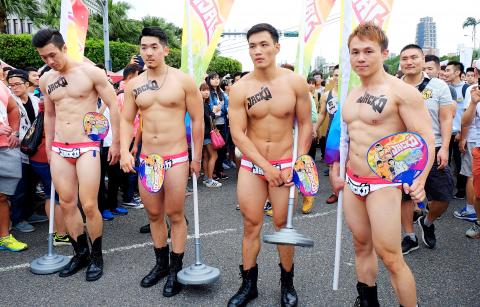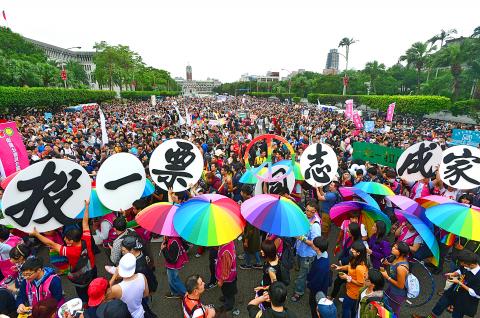The annual Taiwan Gay Pride Parade took place in Taipei yesterday afternoon, with the event centering on the theme of “no age limits,” with event organizers saying that members of the lesbian, gay, bisexual and transgender (LGBT) community and their supporters were invited to attend the event and explore ways in which society’s attitudes toward age and gender prevent people from freely expressing themselves.
People who contravene society’s “norms” are often seen as irresponsible and ostracized, the organizers said, adding that teenagers and older people often suffer the worst of this treatment, as society is more rigid in its expectations of these age groups.
Many participants at the parade, now in its 13th year, wore colorful costumes and waved rainbow flags or handmade signs calling for marriage equality.

Photo: AFP
Organizers said nearly 80,000 people attended the event.
However, the organizer’s call for “no age limits” sparked concerns over its interpretaion.
Lee Tsung-hua (李宗華) of the Warm Breeze Caring Association, a Taichung-based group advocating child welfare, said the association has always supported the LGBT community, but it could not disagree more with calls for young people to be liberated of age restrictions placed on their behavior.

Photo: Wang Yi-sung, Taipei Times
Yeh Chun-hsing (葉春幸), a legislative candidate of the Faith and Hope League, also opposed the group’s call for “no age limit,” saying that repeated calls to lower the legal age for sexual consent on the grounds of sexual autonomy would only lead to an increase in social problems such as abortions and sexual assault.
Earlier in the day, Democratic Progressive Party Chairwoman and presidential candidate Tsai Ing-wen (蔡英文) posted a video on Facebook, saying she supported marriage equality, and that all are equal before love.
Later, in response to media queries about the issue of regulations recognizing unions between same-sex couples, Tsai said it is an issue that society must confront, adding that as there are supporters and opponents, she hopes everyone can view the matter rationally.
Chinese Nationalist Party (KMT) spokesperson Lin Yi-hua (林奕華) said KMT presidential candidate Eric Chu (朱立倫) agreed with the broad direction of the LGBT activists’ stance on equal opportunities for marriage rights, but added that there should be more discussion over the issue due to the diverse range of opinions held in society.
A consensus must emerge among the public before matters can proceed toward legal amendments, Lin said.
People First Party Chairperson James Soong (宋楚瑜) said via party spokesperson Chen Yi-chieh (陳怡潔) that the PFP favors respect and acceptance on the issue of gay rights.
Additional reporting by Su Fang-ho and Chen Yen-ting

MORE VISITORS: The Tourism Administration said that it is seeing positive prospects in its efforts to expand the tourism market in North America and Europe Taiwan has been ranked as the cheapest place in the world to travel to this year, based on a list recommended by NerdWallet. The San Francisco-based personal finance company said that Taiwan topped the list of 16 nations it chose for budget travelers because US tourists do not need visas and travelers can easily have a good meal for less than US$10. A bus ride in Taipei costs just under US$0.50, while subway rides start at US$0.60, the firm said, adding that public transportation in Taiwan is easy to navigate. The firm also called Taiwan a “food lover’s paradise,” citing inexpensive breakfast stalls

TRADE: A mandatory declaration of origin for manufactured goods bound for the US is to take effect on May 7 to block China from exploiting Taiwan’s trade channels All products manufactured in Taiwan and exported to the US must include a signed declaration of origin starting on May 7, the Bureau of Foreign Trade announced yesterday. US President Donald Trump on April 2 imposed a 32 percent tariff on imports from Taiwan, but one week later announced a 90-day pause on its implementation. However, a universal 10 percent tariff was immediately applied to most imports from around the world. On April 12, the Trump administration further exempted computers, smartphones and semiconductors from the new tariffs. In response, President William Lai’s (賴清德) administration has introduced a series of countermeasures to support affected

CROSS-STRAIT: The vast majority of Taiwanese support maintaining the ‘status quo,’ while concern is rising about Beijing’s influence operations More than eight out of 10 Taiwanese reject Beijing’s “one country, two systems” framework for cross-strait relations, according to a survey released by the Mainland Affairs Council (MAC) on Thursday. The MAC’s latest quarterly survey found that 84.4 percent of respondents opposed Beijing’s “one country, two systems” formula for handling cross-strait relations — a figure consistent with past polling. Over the past three years, opposition to the framework has remained high, ranging from a low of 83.6 percent in April 2023 to a peak of 89.6 percent in April last year. In the most recent poll, 82.5 percent also rejected China’s

PLUGGING HOLES: The amendments would bring the legislation in line with systems found in other countries such as Japan and the US, Legislator Chen Kuan-ting said Democratic Progressive Party (DPP) Legislator Chen Kuan-ting (陳冠廷) has proposed amending national security legislation amid a spate of espionage cases. Potential gaps in security vetting procedures for personnel with access to sensitive information prompted him to propose the amendments, which would introduce changes to Article 14 of the Classified National Security Information Protection Act (國家機密保護法), Chen said yesterday. The proposal, which aims to enhance interagency vetting procedures and reduce the risk of classified information leaks, would establish a comprehensive security clearance system in Taiwan, he said. The amendment would require character and loyalty checks for civil servants and intelligence personnel prior to